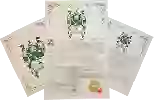
Domaine Champ-LongCuvée Elevée en Fût de Chêne Côtes du Rhône
This wine generally goes well with beef, game (deer, venison) or lamb.
Food and wine pairings with Cuvée Elevée en Fût de Chêne Côtes du Rhône
Pairings that work perfectly with Cuvée Elevée en Fût de Chêne Côtes du Rhône
Original food and wine pairings with Cuvée Elevée en Fût de Chêne Côtes du Rhône
The Cuvée Elevée en Fût de Chêne Côtes du Rhône of Domaine Champ-Long matches generally quite well with dishes of beef, lamb or game (deer, venison) such as recipes of millet with gruyere cheese, lamb stew with yoghurt and coriander or boar in civet.
Details and technical informations about Domaine Champ-Long's Cuvée Elevée en Fût de Chêne Côtes du Rhône.
Discover the grape variety: Orbois
Orbois blanc is a grape variety that originated in France (Loire Valley). It produces a variety of grape specially used for wine making. It is rare to find this grape to eat on our tables. Orbois blanc can be found in several vineyards: South-West, Cognac, Bordeaux, Loire Valley, Provence & Corsica, Rhone Valley, Savoie & Bugey, Beaujolais.
Informations about the Domaine Champ-Long
The Domaine Champ-Long is one of of the world's great estates. It offers 15 wines for sale in the of Côtes-du-Rhône to come and discover on site or to buy online.
The wine region of Côtes-du-Rhône
The wine region of Côtes-du-Rhône is located in the region of Rhône méridional of Rhone Valley of France. Wineries and vineyards like the Château de Beaucastel or the Chateau de Fonsalette produce mainly wines red, white and pink. The most planted grape varieties in the region of Côtes-du-Rhône are Mourvèdre, Viognier and Marsanne, they are then used in wines in blends or as a single variety. On the nose of Côtes-du-Rhône often reveals types of flavors of pineapple, red plum or sour cherry and sometimes also flavors of truffle, juniper or clove.
The wine region of Rhone Valley
The Rhone Valley is a key wine-producing region in Southeastern France. It follows the North-south course of the Rhône for nearly 240 km, from Lyon to the Rhône delta (Bouches-du-Rhône), near the Mediterranean coast. The Length of the valley means that Rhône wines are the product of a wide variety of soil types and mesoclimates. The viticultural areas of the region cover such a distance that there is a widely accepted division between its northern and southern parts.
The word of the wine: Ice wine
Sweet wine obtained by pressing frozen berries harvested in the middle of winter.














